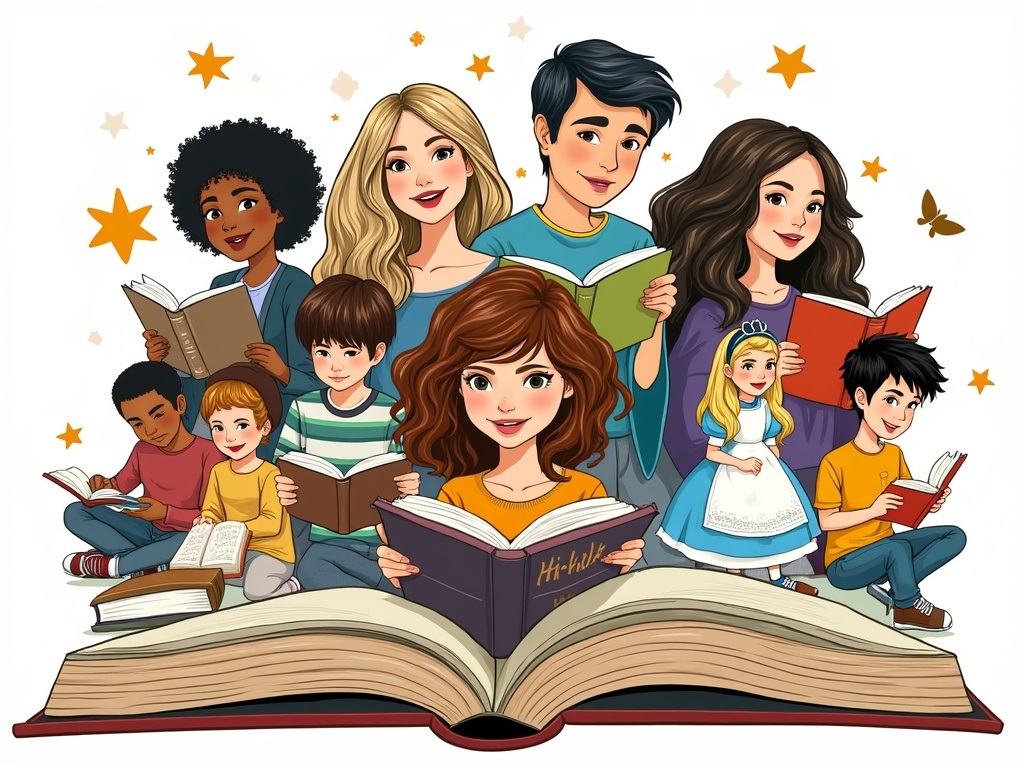Educational books play a crucial role in shaping our knowledge and understanding of the world. Whether you’re a student, professional, or simply someone eager to learn, these resources serve as valuable tools for personal and professional growth. In today’s digital age, educational books have evolved to cater to various learning needs, from academic subjects to self-improvement and beyond. If you’re looking to expand your knowledge base, exploring the world of educational books is a great place to start.

What Are Educational Books?
Educational books are written resources designed to impart knowledge, teach new skills, or provide information on a particular subject. These books can range from textbooks used in schools to self-help guides and specialized manuals. Educational books are not just limited to students; they cater to a wide audience, including professionals and lifelong learners.
How to Read Educational Books Effectively
While educational books are rich in content, simply reading them may not be enough to fully grasp their value. Here are some tips on how to read educational books more effectively:
Take Notes
Jotting down important points while reading educational books can significantly enhance your comprehension and retention. By taking notes, you’re actively engaging with the content, which helps reinforce key concepts in your mind. This practice is particularly useful when revisiting topics or studying for exams, as it creates a personalized reference guide you can quickly review. Whether you use a notebook, digital app, or annotate directly in the book, taking notes encourages you to focus on crucial information, making it easier to recall essential details when needed. This simple habit can transform passive reading into an interactive learning experience.
Set Learning Goals
Before diving into an educational book, establish clear learning goals to keep your reading focused and productive. Setting objectives—like mastering a specific skill, understanding a complex topic, or gaining insights for personal growth—gives your reading purpose and direction. With defined goals, you can prioritize sections that align with your needs, making the process more efficient. Additionally, having a clear purpose motivates you to stay committed, especially when dealing with dense material. This approach ensures you derive maximum value from the book, turning reading into a strategic effort toward achieving your learning ambitions.
Practice Active Reading
Active reading involves engaging with the text, rather than simply skimming through pages. This means asking yourself questions, reflecting on new information, and connecting it to what you already know. By challenging yourself to think critically about the content, you deepen your understanding and make the material more meaningful. Techniques like highlighting key points, writing in the margins, or discussing ideas with others can enhance active reading. This interactive approach not only boosts comprehension but also helps you retain the material longer, turning reading into a dynamic and enriching experience that goes beyond surface-level learning.
Summarize Key Insights
After finishing a chapter or section, take a moment to summarize the key takeaways in your own words. This process of distilling the content into concise notes helps solidify your understanding and ensures that the information is retained in your long-term memory. By writing summaries, you are effectively reinforcing what you’ve learned, making it easier to recall later. This practice is especially beneficial for complex subjects, where retaining critical insights is essential. Regularly summarizing chapters also helps you track your progress, ensuring that you truly grasp the book’s content and can apply the knowledge effectively in real-life situations.
These strategies not only enhance your comprehension but also help in applying the knowledge you acquire.
How to Choose the Right Educational Book
Selecting the right educational book can be overwhelming due to the sheer number of options available. Here’s how you can narrow down your choices:
Assess Your Learning Goals
When selecting an educational book, it’s essential to first assess your learning goals. Take a moment to ask yourself what you aim to achieve with your reading. Are you interested in acquiring a new skill, such as learning a programming language or mastering a business strategy? Or do you want to deepen your understanding of a specific subject like economics, psychology, or history? By clearly defining your goals, you can narrow your search to books that align with your interests and educational needs. This targeted approach ensures that your reading time is both valuable and effective.
Read Reviews
Reading reviews is a powerful way to gauge whether an educational book is worth your time and investment. Online platforms like Amazon, Goodreads, and independent blogs often feature detailed reviews from both experts and readers who have already explored the content. These reviews can provide insights into the book’s quality, clarity, and whether it delivers on its promises. Pay attention to reviews that discuss the book’s structure, depth, and how well it communicates complex topics. This research helps you make an informed decision, saving you from wasting time on books that may not meet your expectations.
Consider the Author’s Expertise
The author’s background and expertise are critical when selecting an educational book, as they influence the credibility and accuracy of the content. Check the author’s credentials to ensure they have relevant qualifications, experience, or a strong track record in the subject matter. A well-researched book written by a recognized expert will offer more reliable and valuable insights compared to one written by someone without proper expertise. Additionally, researching the author’s other works or their professional standing can further help you evaluate whether their approach to teaching aligns with your learning goals.
Sample Chapters
Before committing to a book, consider sampling the first few chapters, as many online platforms allow you to preview a book’s content. This gives you a chance to assess the writing style, the complexity of the material, and how engaging the content is. Sampling can also help you determine if the book’s tone and structure resonate with your preferred learning style. Whether the material is presented in a step-by-step format, through case studies, or with interactive exercises, reading a sample chapter can provide a clearer picture of whether the book aligns with your educational needs.
By considering these factors, you can find educational books that align with your interests and learning objectives.
Must-Read Educational Books
When it comes to selecting educational books, there are endless options, depending on your interests and goals. Here are a few must-read educational books that cover diverse topics:
- “Sapiens: A Brief History of Humankind” by Yuval Noah Harari
This book provides a comprehensive overview of human history, from ancient times to the modern age, making it a must-read for those interested in anthropology and history. - “Atomic Habits” by James Clear
This self-help book focuses on personal development, teaching readers how small changes can lead to significant improvements in life and work. - “Thinking, Fast and Slow” by Daniel Kahneman
A fascinating read for those interested in psychology and behavioral science, this book delves into how our minds work and make decisions. - “Educated” by Tara Westover
A memoir that highlights the importance of education and how it can transform one’s life, regardless of their background.
By exploring these educational books, you can gain valuable insights and broaden your understanding of various subjects.
Where to Buy Educational Books
If you’re wondering where to buy educational books, there are numerous platforms available both online and offline. Here are some popular options:
- Online Bookstores: Websites like Amazon, Barnes & Noble, and Book Depository offer a vast collection of educational books, often at discounted prices.
- Local Bookstores: Visiting your local bookstore can be a great way to discover new titles and support small businesses.
- Digital Platforms: E-books are available on platforms like Kindle, Google Books, NFTBOOKS and Apple Books, allowing you to access educational content on the go.
You might be interested in reading Nonfiction- True Stories and Real-Life Insights as well.
Embrace the World of Educational Books
Educational books are more than just sources of information; they are gateways to a deeper understanding of the world. Whether you’re a student, a professional, or simply a curious reader, these books can enrich your mind and open up new possibilities. By making reading a habit, you invest in your personal and professional growth. So, start exploring the world of educational books today!
Do you have a favorite educational book? Share it in the comments below! And if you’re looking for more insightful reads, check out our latest articles on our NFTBooks Blog.







